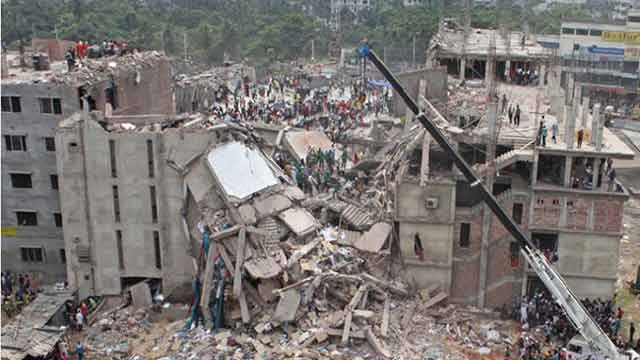Bangladesh will commemorate today the tragic deaths of over 1,130 people in the Rana Plaza collapse, but with utter disappointment as the wait for justice is lingering for years.
Dubbed as the deadliest industrial disaster in the history of Bangladesh, the collapse of the faulty building at Savar in the morning of April 24, 2013 had created a huge outcry in home and abroad, raising concern about workplace safety.
There were five garments housed in the building at Savar bus stand.
The Criminal Investigation Department (CID) dealt with the two cases – filed for murders and for flouting the Building Code, and pressed charges against over four dozen accused including the building owner, Sohel Rana, in 2016.
All but Rana are enjoying a free life after securing bail or being on the run as both the cases have remained stuck with the courts.
Different rights groups, workers’ organizations and leftist political parties are set to observe the day today when over half of the survivors have remained jobless during the Covid-19 pandemic.
Joly Talukder, general secretary of the Garment Workers’ Trade Union Centre, expressed disappointment over the slow pace of the trials.
Alleging that the state was not cordial in ensuring justice for the deaths of workers in accidents, she said: “The persons responsible for the Tazreen factory fire and the Rana plaza collapse have not been punished yet.”
She blamed the prosecution for their negligence in reviving the cases.
Charges were pressed against 42 people including Rana and then Savar municipality mayor Refayet Ullah in the two cases in June 2015.
Of the accused, Rana, his parents and 34 others were charged with causing the death of the workers while four others were accused of sheltering Rana and helping him flee soon after the incident.
In 2016, two separate Dhaka courts indicted the 42 accused, and set September 18 the same year to begin trial in the cases where some 594 people have been made prosecution witnesses.
But the trials did not begin in the last five years.
While local ruling party leader Rana languishes in jail, 31 accused are on bail and six others are still on the run. Three accused died in the meantime.
Rana’s counsel Faruk Ahamed also blamed the prosecution for the slow trial proceedings in the cases.
“We also want speedy trial because my client is serving jail without trial,” he told.
The murder case
After the charges were framed against all the accused on July 18, 2016, eight accused including former mayor Refayet Ullah and councillor Mohammad Ali Khan filed writ petitions with the High Court challenging the indictment order.
Hearing the petitions, the HC stayed the case proceedings that year. Later, the Dhaka district public prosecutor wrote to the Attorney General Office to have the stay orders vacated.
Even though the HC vacated the stay orders for six of the accused, the two others filed by Refayet and Mohammad Ali – imposed on May 9 and December 12 in 2018 – are yet to be quashed.
Asked about the stay orders, Attorney General AM Amin Uddin yesterday told that they would take necessary steps after the pandemic situation improved.
He insisted that the government wanted quick completion of the cases because many people had died in this deadliest industrial disaster of the country.
The other case
Meanwhile, on July 18, 2016, the Dhaka Additional Chief Judicial Magistrate Court framed charges against 18 accused including Rana in the case filed for violation of the Building Code.
But the court is yet to start recording deposition of witnesses as several accused submitted revision petitions, challenging the indictment orders, with the HC, according to Anwarul Kabir Babul, additional public prosecutor of the court.
Survivors’ woes continue
Over 2,000 people – mostly garments workers – sustained serious injuries as the nine-storey building collapsed on this day eight years ago.
According to a recent survey conducted by ActionAid Bangladesh, around 57% of the survivors have remained unemployed during the Covid-19 pandemic.
It says that the physical and mental state of the survivors did not improve significantly and their overall quality of life degraded in the last eight years due to joblessness.
The survivors who have jobs are also suffering due to the Covid-19 induced economic fallout.
Around 92% of them did not get any support from the government during the pandemic but some of the respondents received food, health and hygiene material support from local-level groups and individuals, says the survey.
The physical condition of 14% of the survivor is worsening as they complain of living with different complications including headaches, pain in arms, legs and backs. Many survivors could not return to work after treatment due to physical and mental health conditions.
mj/





